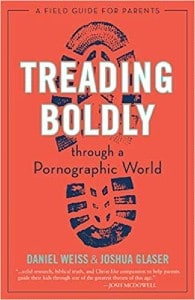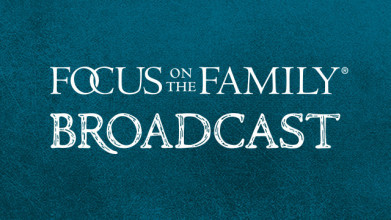
Homemade Meals for Busy Families
Mary Beth Lagerborg, co-creator of Once-A-Month-Cooking, discusses the importance of hospitality and how families can prioritize dinner time by cooking a month’s worth of healthy meals in one session.
Home » Episodes » Focus on the Family Broadcast » Equipping Your Kid to Resist Pornography
Preview:
Daniel Weiss: We encourage parents, “Normalize this.”
Jim Daly: Yeah.
Daniel: You might talk to your kids about finances, you might talk to your kids about good eating habits, or going to bed and getting enough sleep, or all kinds of things that impact their lives. This is something that should be so normalized, that the kids don’t blush, and you don’t blush when it comes up. You know, it’s looking at a TV commercial and just saying, what’s the message here? Let’s make sure we’re not being deceived by something that’s false.
End of Preview
John Fuller: That’s Daniel Weiss. He’s our guest on Focus on the Family, along with his co-author, Josh Glaser. And they’re gonna offer help for guiding your kids through the digital landscape. Now, please be aware, this program isn’t appropriate for younger children, but be sure to download the podcast or view the conversation on YouTube. Your host is Focus president and author, Jim Daly, and I’m John Fuller.
Jim: John, this topic can be really intimidating, and my boys are grown up now, and of course, we did the talk. But this was, you know, the regular touch base how you are doing in this area conversation. And, you know, I’m grateful, it was normal, typical, it wasn’t perfect, I don’t wanna project that either. But you have to stay diligent as a parent, and that’s the spirit in which we wanna do this broadcast today. 67% of young males and 57% of young adults view pornography.
John: Mm.
Jim: And in this generation, porn use isn’t the exception, it’s now the rule, and we as Christian parents, one we have to model it well, how to not use it, and then two, how to help our children manage this. So, stick with us, don’t turn us off, I think it’s gonna be a great discussion, especially for parents.
John: Mm-hmm. And joining us in the studio are Josh Glaser and Daniel Weiss. They each have decades of experience working in ministries that promote biblical sexuality. Josh is executive director of Regeneration Ministries, and he and his wife Jamie have five children. Daniel is founder and president of the Brushfires Foundation and serves as executive director of the Sexual Integrity Leadership Summit. Jim, we should note Daniel used to work here at Focus on the Family…
Jim: (laughs) We’re proud of him.
John: …analyzing issues on sexuality in the family, and he and his wife Krista have five children. We’re gonna be talking about a book that these gentlemen have written together called Treading Boldly Through a Pornographic World. And this really is a great guide for parents.
Jim: Yeah, Daniel and Josh, welcome back to Focus.
Josh Glaser: Thanks. Thanks. Glad to be here.
Daniel: Yeah, thank you so much. Such a formative time, my time here, I’m glad to be back.
Jim: Yeah, it’s good to see you. And I wanna say thanks for leading the charge on this really delicate topic. And you know, again with the data that we’re talking about, we’re all familiar with. It’s almost like we can’t talk enough about this and get it out in the open so that people can heal, and get on a healthier track when it comes to sexual expression, particularly in the Christian church, right?
Daniel: Yeah, that’s absolutely true and I think one of the messages we’d like to share with parents is if there was ever a time we could avoid this subject, that’s certainly not now. And we don’t believe there’s ever a time parents shouldn’t be guiding their kids and, and discipling them in all elements of faith, including their sexuality. But pornography is an issue in your home, whether you know it or not. It’s an issue because it’s an issue in this culture.
Jim: It permeates the culture.
Daniel: It’s in everything. And so, whether your kids are actively looking at pornography or not yet, you know, or not at all, they’re around all the other kids that are, and that definitely shapes youth culture in a major way, so this is a topic we want you to encourage parents to understand now is the time to start small, to start in healthy ways, age appropriate ways, but definitely if you haven’t started, you gotta start. Because our kids need us and more than that, they actually want us in this conversation.
Jim: Yeah, and I’ll tell you at Focus, we’ve got so many great resources. It’s kind of like drip irrigation. But let’s go to the social acceptance of pornography and how that has changed over time. And if I could double down on the question, how has violence and violent content become even more a part of that?
Daniel: Yeah, I think when you mention the word pornography in a group, or in a one-on-one setting, I think a lot of people’s minds will go to, I mean, as naïve as it sounds, like a calendar pin up you’d see in an auto shop, or the cheesy 70s, you know, pizza guy plot, storyline, movie where they’re either showing sex, but it’s kind of story driven, almost. That hasn’t been the case since the 70s. And research that we cite in the book from 2007 showed that this research team analyzed 50 of the top selling pornography movies in the country, the previous year, and 88% of them had sexual violence in them.
Jim: Hm.
Daniel: So pornography is not when people say hey, I’m sex positive. Well, pornography is not sex positive. Pornography is violence, and degradation, and shame positive. It’s teaching everything we don’t want, not just Christian kids, but any kids, any adults to know. And it’s, and it’s shaping people’s, especially our kid’s, sexual templates. They see this…
Jim: Yeah.
Daniel: …as real and normal, and they act accordingly.
John: Mm-hmm.
Jim: Well, and that’s the damage done when it starts early. Which is why, again, we encourage diligence on the part of parents, to be engaged. Know their child’s environment, what they’re looking at, especially with online accessibility now, and the anonymity of it. I mean, your kids can look at things and you’ll never know. Sometimes it’s so easy to hide. Spyware doesn’t always catch things and, you know, you learn that over time. But speak to that danger because again, I think as a Christian community, we wanna project the goodness of God and what he’s created here. But it’s that distortion, that manipulation, that we’re trying to correct, and the damage that’s done when that happens. So, how do we help our kids at that developmental stage, the right developmental stage? How do we protect them and how do we help them?
Josh Glaser: I think one of the things we have to do first and foremost is start with God’s positive design.
Jim: Start with the real thing.
Josh: Yeah, the real thing.
Jim: Yeah.
Josh: If parents haven’t had conversations like that, and we stress conversations. Part of the reason we feel so much pressure, part of the reason we struggle to have the conversation is because we don’t talk about it enough.
Jim: Yeah.
Josh: The more we talk about it, the more comfortable we get, the more our kids recognize, yep, mom and dad talked to me about this kind of stuff, this is part of what happens in our family. So, if it feels awkward to you, keep pushing through, it’ll feel less and less awkward.
Jim: Let me, can I interrupt you for a second?
Josh: Yeah, of course.
Jim: Because it’s so important, some people are gonna get ahold of us and they’re gonna be very offended that we had this discussion, that we talked about it. And I would like to appeal to them in the best way, to say things up in the light of day, things on the table, it’s important. Because the Lord, I think, in my belief, can work with that. It’s when it’s hidden, it’s under the table, it’s in the dark, that it does such destruction.
Daniel: Yeah, the other thing, Jim, is, for those parents out there that say we shouldn’t talk about this we have to understand the culture is not shy about talking to our kids about sex.
Jim: Ah, man.
Daniel: And nearly everything the culture’s saying is a distortion, a lie, or something more malicious than that.
Jim: Yeah.
Daniel: And so that’s what’s shaping our kids, and as you said, and Josh said, don’t have fewer conversations, or one big conversation. We encourage parents, normalize this.
Jim: Yeah.
Daniel: Normalize this. You might talk to your kids about finances, you might talk to your kids about good eating habits, or going to bed and getting enough sleep, or all kinds of things that impact their lives. This is something that should be so normalized that, that the kids don’t blush, and you don’t blush when it comes up. In looking at a TV commercial and just saying what’s the message here? Let’s make sure we’re not being deceived by something that’s false. I mean, it’s not always even about sex, it’s just about how men and women are portrayed. But laying that foundational groundwork for understanding God’s good design. That’s how we can have open, honest conversations.
Jim: Yeah, and I think that’s so good. You know, some parents have taught their kids that purity is really important, which it is. And that being a virgin at the time of marriage is kind of the key goal. But you can also get some dysfunction in that if you’re not careful, and you guys write about that. Describe that potential dysfunction when we’re locking it down, locking it down, and then boom, they come in with some problems.
Daniel: Yeah, I share a story in the book. Thankfully, I can be open about this. I was a virgin, technically, you have to almost add that term now. But I was a virgin when I got married. And I was really proud of myself, and I thought it was like ah, I did it. But I realized later when God kind of got ahold of me and some of my sexual brokenness, I was dealing with lust, I had acted out sexually with other gals in college, I had looked at pornography countless times, so I was kinda, as they say, the whole house was burning, but I was glad and proud that I had saved the front door.
Jim: Mm-hmm. That’s an incredible analogy.
Daniel: It’s not about, you know, this binary view of you are or you aren’t. I think that’s where we get into trouble. Because that eliminates the quality of grace in this, and forgiveness. And none of us walk out our sexuality perfectly, not one. We all fall short. And that’s very scriptural. So let’s approach it from that perspective and say, let’s cultivate positive, healthy habits of the heart. This chastity idea, where even in a misstep, like God is still with us. We’re still moving forward toward his good, godly design for us, which blesses us and allows us to thrive.
Jim: Yeah.
Daniel: And that’s something that’s ever in front of us, it’s not something behind us now that we’ve lost.
Jim: Mm-hmm.
John: Yeah, this is Focus on the Family with Jim Daly, and our guests today are Josh Glaser and Daniel Weiss. And we’re talking about the content in their book, Treading Boldly Through a Pornographic World. Get a copy from us here at the ministry at focusonthefamily.com/broadcast or call us. Our number is 800, the letter A, and the word FAMILY.
Jim: Let’s talk about technology. You both kinda come at it a little differently. So Josh, starting with you.
Josh: Yeah.
Jim: How do you approach technology in your home and how do you batten down the hatches?
Josh: (laughs)
Jim: (laughs)
Josh: Man, well, we don’t do it perfectly. But we took on, early on, we made a decision that our kids are growing up in a digital age and at some point, they’re all gonna have phones, they’re gonna have digital devices in their pockets and they’re gonna need to navigate these things. So we decided progressively, as they grew, we would entrust them with more and more responsibility to have their own, their own devices. And the idea was, if they’re gonna make mistakes, we want them to make mistakes in our home.
Jim: Right.
Josh: If they’re gonna learn we want them to learn in our home. So there’ve been ups and downs, and things we’ve tried, and things we’ve taken back. From an early age, one of the things we did was if our kids were on one of our computers, and they’re doing something online, and by the way, like I grew up a digital immigrant, so I knew when I was online and I knew when I wasn’t. I don’t think our kids always know the difference…
Jim: Right.
Josh: …between being on their device and being online. But when our kids would get online, part of what we’d do is to say okay, if you see something inappropriate, what do you do? And we’d walk them through a process there, kind of run fire drills. And then as they got older, they would have just more responsibility with that. We did have some filtering software on our devices, so that we could see what they were looking at. We have all our kids use their devices in public spaces. And as they get older if they’re demonstrating that they’re being responsible, that they’re paying attention to things that we’re paying attention to…
Jim: Mm-hmm.
Josh: …then they’re given more and more freedoms. So, you know, our oldest daughter now has a phone and she’s like, you know, can I use it in my room to wake up to? And she talks to us about, you know, I’m not texting people late at night. That doesn’t happen for me, that kind of stuff. Like, okay, next year you’re gonna be in college anyway, so yes you can.
Jim: Yeah. Yeah. You may not do that with a freshman…
Josh: Right. Right.
Jim: …in high school, but maybe a senior it’s time to give that responsibility over. Daniel what did you do differently? Or what are you doing differently?
Daniel: Yeah, we did approach it differently. And, and I wanna say, right off the bat, that by us choosing a different path, there’s no part of me that says I think Josh and his family are doing it wrong.
Jim: (laughs)
Daniel: And I really think that’s important for parents to hear.
Jim: Yeah.
Daniel: There’s not a one size fits all solution here.
Jim: Mm-hmm.
Daniel: This is very much a relational issue within the home. And so in our home, as we said, we try to keep our kids analog as much as possible, for as long as possible, as they were growing up. So we didn’t want them spending hours in front of the TV, hours in front of a video game system. We do live in a rural part of the country, on a family farm. So we’ll say go out and climb trees, go out and play with the animals, and that was part of what we hoped would be a gift to them.
Jim: Mm-hmm.
Daniel: Now that I’ve got teenagers and some still, pre-teens, you know, we’re phasing into a little bit more of what Josh is doing. Teaching responsible tech use, teaching how we act in the world needs to be the same way we act online. So manners don’t just get thrown out the window. But having those normalizing talks about the reasons why we’re concerned about their tech use, and what we hope they don’t encounter because of that. And, and I think being an analyst here at Focus on the Family for so many years, I got to see a lot of the research on just how impactful large scale media use is on kids.
Jim: Yep.
Daniel: It can be very damaging. And that doesn’t mean your kids messed up, but statistically speaking, the kids that are on their devices a lot just are doing more poorly in all kinds of measures. So knowing that research, we wanted to hold them off as much as possible, but then introduce it…
Jim: Yeah.
Daniel: …at a proper time.
Jim: Describe your three-fold approach to technology, I think it’s guiding, guarding, and growing. So how does that work?
Josh: Yeah, so that was just our attempt to kind of encapsulate some different areas that parents can think about when they’re trying to approach all these topics with their kids. So, the guiding part is, just giving our kids some counsel, walking alongside them, encouraging them along the way. One of the things that we’ve told our kids, for example, is if you’re doing an internet search, the more specific you can be about what you’re looking for, the less chance you’re gonna find something that you’re not looking for.
Jim: Ah, that’s good.
Josh: Instead of searching for, hey dad, I wanna draw a picture of a bunny, can I, you know…
Jim: Right.
Josh: …can I type the word bunny in? Well, like picture of a bunny to draw from. (laughs) You know, try that.
Jim: Yeah, that’s good advice.
Josh: Guarding is, these are what we bring in because we’re older, we’re wiser, we’ve been down the road, we know what some of the dangers are. And so, whether it’s internet filters, or it’s setting specific parameters and boundaries around when we can use our technology…
Jim: Time limits.
Josh: …that kinda stuff, that’s guarding. One of the places that parents will run into, by the way there, is their kids will say why don’t you trust me? And so one of the things we like to say is, we absolutely trust you. We do not trust the internet.
Daniel: Mm-hmm.
Jim: Right. That’s good.
Josh: We don’t trust the intentions of anybody else on there. So we’re not guarding them from you, we’re guarding you from them. So, and then growing, that’s just recognizing that we’re all in a, in a process. And so, we’re not looking for perfection from our kids in this regard. We want them to learn both from us, we also want them from things they’re discovering about themselves, and things that, even the mistakes that they make. And so, some of my proudest moments as a dad have been when I walk into the room and my daughters on her phone and she says dad, here, and she throws her phone to me and says, I’m just not using it well today. And I go, fantastic, you know, what’s going on for you?
Jim: That’s good. Wow.
Josh: And what might be happening that you’re, you know, being sucked in more today than other times?
Jim: Yeah.
Josh: That’s, that’s her growing.
Jim: All right, lets get to some really nitty gritty questions. If you discover your child is viewing porn, how do you respond as a parent?
Josh: Man, the first thing is so counterintuitive. First thing you need to do is you need to step away and breathe. So many parents just want to run in and address it right away.
Daniel: Shut it down.
Josh: Shut it down, like let’s fix this. But we advise that parents actually need to collect themselves for a bit if they can. If they’ve got an ally, a spouse, somebody they can just say, this is what just happened, you gotta talk me off the ledge cause I’m, I’m freaking out here. Cause otherwise, if they don’t do that, what’ll happen is they’ll go and they’ll put their adult size, parent size angst on their kids. And basically say, I’m not okay until this is fixed, and we don’t wanna do that. We really wanna go in, in that moment, and be present to our kids where they are as much as possible.
Jim: No, that’s good, I think one of the things too is the shaming factor. You gotta be really careful…
Daniel: Yes.
Jim: … in the shame context.
Josh: Absolutely.
Jim: Cause I think that could really, especially, you know, boys. Man, if a mom’s coming down hard on the boys and, and I’m sure that’s true for girls as well.
Josh: Yeah.
Jim: But I just think, again, that connection between mom and son can really be ruptured if she’s not careful in that moment.
Josh: Yeah.
Daniel: You know, I have a story. We were watching a movie as a family and my daughter turns to me and says hey, dad something’s not right. And she had, 20 minutes earlier, friended someone on Facebook.
Jim: Mm.
Daniel: She’s one of the few teenagers that actually uses Facebook.
Jim: (laughs)
Daniel: (laughs) But she friended someone she thought she had gone to school with, turned out it wasn’t this person. And within a few, literally a few minutes, the guy was sending sexually explicit…
John: Mm.
Daniel: … questions, and basically…
Jim: Uh-huh.
Daniel: … trying to groom her actually.
Jim: Yeah.
Daniel: If you know that term.
Jim: Right.
Daniel: And he was clearly older than her, in his 20s, it looked like. And she showed it to me, and I did everything wrong in that moment. I freaked out. I freaked out. My dad’s heart was like what are you doing to my daughter?
Jim: Yeah.
Daniel: And of course, it came out, and I’m like, and then I’m like why are you texting this guy?
Jim: Right.
Daniel: And I did everything wrong. I didn’t collect myself, and I had a lot of backtracking to do. And even the next few days I would check in with my daughter, and say, look, I am so sorry I reacted the way I did. I’m so proud that you brought it to me, and I wanna explain my reaction was not that I was angry with you, it’s that I was so furious someone would do this to you, and inflict this on you, but that’s why we say, for parents, look, you’re gonna make mistakes. We make mistakes. This is a journey and a process we’re on. But it is important to, to think about it in advance, and be prepared for some bad news to come at you at any moment.
Jim: Well, and every situation is a learning opportunity.
Daniel: Yeah.
Jim: If you’re treating it that way, actually, you’re making ground.
Daniel: Yeah. Absolutely.
Jim: Even when it feels like, as a parent, you’re going backward. But you are moving forward.
Daniel: Yeah.
Jim: You have a story about Amanda, I think her name was, in the book. Where she had some difficulty with her dad. How would you say that story plays out with the pornography issue?
Josh: Yeah, so this, this is later on. So if you, if you’ve discovered that a son or daughter’s looking at porn, and if they are open to walking away from that, getting some help in that. Amanda fit in that, in that camp, and she was actually seeing a therapist. So she and her therapist began to recognize there was a correlation between an increase in her temptation to look at porn and her time at her dad’s house. And so she began to explore, well what’s going on there? Why is that happening? And she realized that she, she actually began taking a kind of doing a feelings log, writing down what am I feeling around that time? Because like a lot of people like to say, like, a pursuit of pursuing pornography is you’re looking for something legitimate but you’re looking for it in an illegitimate place. And so, she began to just treat, with kind of curiosity and kindness, like, why am I more prone to that there? And she realized that she felt like a visitor in her dad’s home, and she felt lonely. And so as she unpacked that with her therapist she realized, okay well, I’m not at home when I go visit my dad, I’m further away from my friends. He’s got a little tighter restrictions on my phone use here so I can’t even be in touch with my friends that way. And so all of those things kind of coalesced and, now she’s also writing that, that kind of, that center of dealing with the reality that her parents are no longer together, and she feels like a visitor at her dad’s house.
Jim: Huh.
Josh: And so she was looking to porn to try to bring her comfort, to try to help her, you know, deal with some of the sadness. Once she realized that, she could go back to her dad and say I feel like a visitor in your house, and this hurts.
Jim: Wow, that’s it’s an interesting journey to piece those things together…
Josh: Yeah.
Jim: … cause they, at the surface, they wouldn’t look connected.
Josh: No, not at all.
Jim: But wow, that’s really good work on her part.
Josh: Yeah, and again, you know, she’s an older teen, I think, at this point. But most kids would need help processing and would not be able to probably go that deep, depending on their age and their maturity. But this is some of the important and beautiful relational work that parents have in front of them. And not that parents necessarily know how to do that either, but I think that it’s just a great opportunity to get to know our kids better. Like, if we’re just thinking about pornography use as, you’re doing something bad and you need to stop it, God’s not happy with this, I’m not happy with this. I don’t want this in my house. You’re missing an opportunity to, to really explore, excavate, and so instead of being like a, you know, private investigator looking for dirt, you’re helping your son or daughter excavate what’s really going on inside of me that I’m going to these things.
Jim: Yeah, I mean, it’s gonna be there, all the truth is gonna be there.
Josh: Always. Yeah.
Jim: Which is so good.
Daniel: Yeah, Josh used the word curiosity. I mean, that’s something we don’t normally associate curiosity and pornography, right? That’s what we don’t want, kids being curious and looking for porn. But I think with these wounds, and these, the relational longings, it’s good for parents to guide their kids into a place of curiosity. We have other stories in the book as well, like, feeling rejected by friends might be a trigger that leads you to go find some solace or consolation in this content that gives a temporary relief.
Jim: Yeah.
Daniel: So the more we can be curious about that, I think we can get to that point of truth at the core of our being. And then begin to untwist those things that have been twisted in us.
Jim: Well, and you know, you look at scripture generally, and that is the destiny idea that, look at King David. I mean, I always struggle with the fact that he committed the two big ones, and the Lord said he had a heart after him.
Josh: Mm-hmm.
Jim: Seriously, Lord, how is that? It’s that same kind of concept though, that nothing goes for loss in God’s economy. Like he’s gonna you teach you…
Josh: Yes.
Jim: … when you fall. And we don’t have good tolerance for that in the Christian community. We’re expecting perfection, and, you know, one of the things Jean and I often talk about is, you know, older Christians, we kind of project that on our teen boys. You know, we expect them to behave like we would behave today.
Daniel: Mm.
Jim: And it’s always a good reminder to say, oh okay, what were we thinking about at 16 and 17? How were we behaving back then? And it’s hard, cause we expect so much out of our kids, and that can be so damaging. Let’s end with this as we close. How would you encourage parents who are discouraged and worried? And, you know, they’re full of fear. And the world is eating my children, spiritually, I mean, all this stuff’s coming at them, and I can’t contain it all, and I don’t have enough spyware to protect them, and I’m overwhelmed, and it’s happening, and you can just spiral out of control.
Daniel: Yeah.
Jim: How do you get a grip on all of that and say, okay, Lord, what do I do?
Daniel: I think it’s important for parents to understand, as much as they love their children, God loves their children even more. And so God really is for them. But part of that is, God is for the parents as well. And we devote part of the book to this. It’s parents are on this journey, they need to be present with their own past and present, their fears, their concerns, and be fully present with God in those places so that they can find some healing. Maybe some forgiveness they haven’t had before, some reconciliation with their own past. But that’s how they become more present with their kids. And our kids really need us, it’s not our rules, it’s not our words. They really need us on this journey. And so we see this whole book, the Treading Boldly concept is we believe this really challenging situation so many families are facing looks like an opportunity for fear and withdrawal. But it’s actually an opportunity for God to reshape your family in some amazing ways. To have the conversations you’ve been afraid to have, to open up and talk about feelings and relational challenges. We just have nothing but hope, hopefulness for families going through this process because they’re doing it with Christ, who so desperately desires for families to be healed.
Jim: You know, I think the enemy takes us to that place of catastrophization. If I can use that newly coined word. I mean it just really, you know, it’s, it’s catastrophe, and the Lord will use all these things to mold and shape each of us like you’re saying, as a parent, and then as a teen, or a child. And I think that’s the big, long view we need to have. Take that deep breath, get some space, get some oxygen, pray, and then engage. And know that the Lord is with you in these things. And do it with a spirit of humility, not anger. This has been good. I mean, this is such a great discussion.
I hope people have and been inspired and certainly the book Treading Boldly Through a Pornographic World. Outside the Bible, I can’t think of a resource a parent needs more (laughs) than something like that right now. So thank you for the diligence in putting it together, and all the years of experience that you guys have plowed into this.
I hope you’ll get in touch with us. I mean, we’re here for you, we are a marriage and parenting ministry, so we want to stand in the gap for you. If you can make a gift of any amount, a monthly gift, a one-time gift, we’ll send the resource as our way of saying thank you. If you can’t afford it, that’s not the issue, we’ll trust others will cover it, just call us, tell us you need it, and we’ll get it to you.
John: Donate as you can when you call 800, the letter A, and the word FAMILY. Or stop by focusonthefamily.com/broadcast.
And I think we mentioned this earlier, but we do have caring Christian counselors here. If this is something you’re struggling with personally, or as a parent you’re really challenged by what you’ve heard today and need some further encouragement, contact us, and let us set you up with a free consultation with one of those counselors. Again, our number, 800, the letter A, and the word FAMILY.
Jim: Josh and Daniel, thanks again for being with us. It’s been really good.
Josh: Thank you so much for having us.
Daniel: Yeah, it’s our pleasure to be here.
John: Mm-hmm. Well join us next time as we hear an uplifting message from Sheri Rose Shepherd.
Preview:
Sheri Rose Shepherd: I earned my master’s degree in acting. And I earned my Doctorate degree in denial. See, we women, especially us Christians, we’ve mastered acting. How are you doing? Great! Me too! I’ve never had a problem in my life. I don’t even need a Savior. Me neither.
End of Preview
John: Thanks for joining us today for Focus on the Family with Jim Daly. I’m John Fuller, inviting you back next time as we once more help you and your family thrive in Christ.

Daniel Weiss is a writer and speaker. He has spent two decades helping church and community
leaders, educators and policy makers address complex situations surrounding sexual brokenness with
hope and life‐giving truth. In 2012, Daniel established The Brushfires Foundation to equip Christian leaders to foster sexual integrity in their churches and communities. He serves as lead author of Sexuality & the Church in America. Prior to founding The Brushfires Foundation in 2012 and serving as its president, Daniel was the senior analyst for media and sexuality and social issues manager with Focus on the Family for nearly nine years. Daniel and his wife, Krista, live with their five children in rural Wisconsin.

Receive the book Treading Boldly for your donation of any amount!

Focus on the Family's staff of licensed, professional counselors can help you bring healing and restoration to your family with Christian perspectives you can trust.

Visit our online store and purchase a CD of today's program for yourself or to share with a friend.

As a parent, you are the most important influence in your child’s faith development – more than friends, social media, or even the youth pastor. Ruth Chou Simons offers practical help for teaching kids God’s Word. She describes why you don’t have to be a perfect parent to model Biblical truths at home.

Start the conversation about human sexuality on a godly note by answering a young child’s first questions about human sexuality.

Knowing how to respond to your young teen’s porn use can be overwhelming. Learn how to approach them with grace, patience, and understanding.

Unfortunately, the effects of pornography negatively impact our teenagers in more ways than we might realize. But there’s hope for parents hoping to help their teens overcome pornography addiction.

Even though pornography is everywhere, you can help your teen learn how to quit watching porn with these strategies.

Plugged In media analyst Jonathan McKee provides research-based insights on the impact of the digital world on children and offers parents guidance for setting safe, healthy boundaries for their kids’ screen time.

Mary Beth Lagerborg, co-creator of Once-A-Month-Cooking, discusses the importance of hospitality and how families can prioritize dinner time by cooking a month’s worth of healthy meals in one session.

Scott Klusendorf, President of The Life Training Institute and Robyn Chambers, Vice President of Advocacy for Children at Focus on the Family, share strategies and encouragement in the pro-life movement. They offer compassion for abortion-minded women and speak up for pre-born babies. (Part 2 of 2)

Scott Klusendorf, President of The Life Training Institute and Robyn Chambers, Vice President of Advocacy for Children at Focus on the Family, share strategies and encouragement in the pro-life movement. They offer compassion for abortion-minded women and speak up for pre-born babies. (Part 1 of 2)

Larnelle Harris shares stories about how God redeemed the dysfunctional past of his parents, the many African-American teachers who sacrificed their time and energy to give young men like himself a better future, and how his faithfulness to godly principles gave him greater opportunities and career success than anything else.

Amy Carroll shares how her perfectionism led to her being discontent in her marriage for over a decade, how she learned to find value in who Christ is, not in what she does, and practical ways everyone can accept the messiness of marriage and of life.

Jonathan McKee offers parents practical advice and encouragement in a discussion based on his book If I Had a Parenting Do Over: 7 Vital Changes I’d Make.